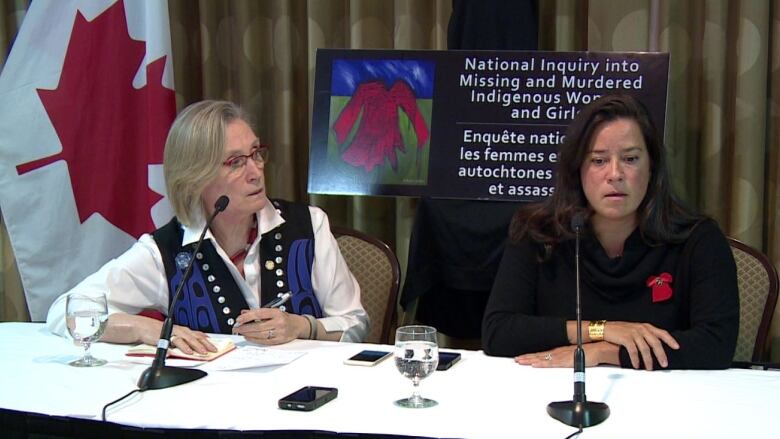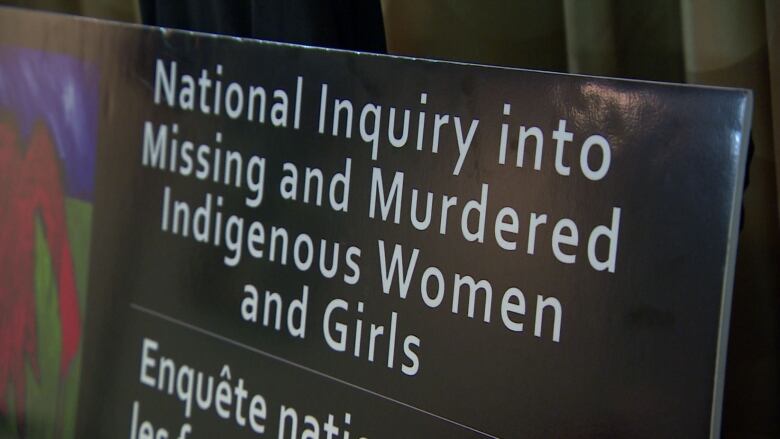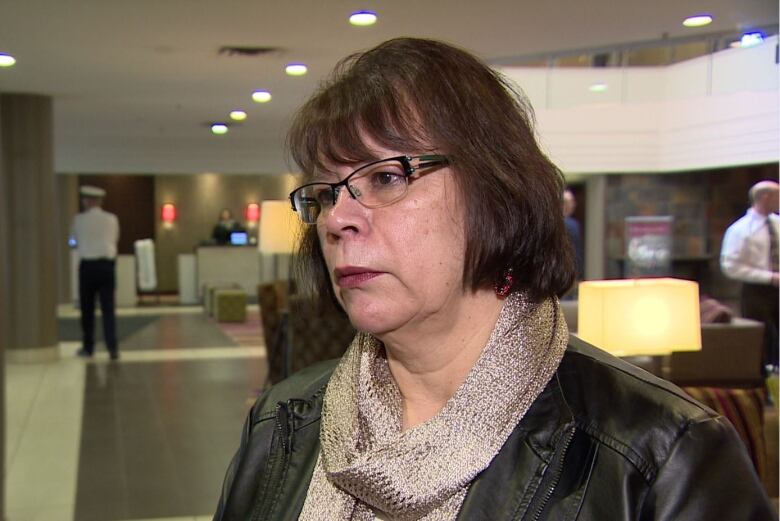Federal ministers in Saskatoon for MMIW pre-inquiry
Minister Carolyn Bennett and Minister Jody Wilson-Raybould listened to families, survivors

It was an emotional and difficult morning for two federal ministers as they gathered with family members of missing and murdered indigenous women in Saskatoon on Wednesday.
Federal Indigenous Affairs minister Carolyn Bennett and Justice Minister JodyWilson-Raybould joined 120 people for the closed-door session at the Radisson Hotel for the pre-inquiry discussions.
"It has been an incredibly emotional and moving morninglistening to the voices of the family and those impacted in a fundamental way by this national tragedy," Wilson-Raybould said.
"More than ever, we have heard messages of inequality and messages that indigenous peoplesindigenous womendon't matter. And we've heard again the unequal application of the justice system."
A wise person once told me that in order to achieve justice you need to understand and feel injustice.- JodyWilson-Raybould, Justice Minister of Canada
The ministers are meeting with family members as part of a cross-Canada pre-inquiry consultation, which began in Thunder Bay in early January.They are asking the families what the inquiry into missing and murdered indigenous women and girls should look like and who should be involved.
"We are committed to ensuring that their voices are heard and are heard broadly,not just within the room today but heard by all Canadians, because it is a Canadian tragedy and the solutions will come by ensuring the voices of the family are heard and that the work that we collectively have to do is underway," Wilson-Raybould said.
Wilson-Raybould said there is a fundamental need to ensure that the framework for the inquiry provides a measure of justice to the families, honours the murdered and the missing, and addresses the systemic barriers that exist within Canadian institutions.
- Missing, murdered indigenous women pre-inquiry meetings begin in Thunder Bay, Ont.
- Missing, murdered indigenous women: families 'hopeful' after inquiry announcement
She added that it's important that indigenous people, especially family members, see themselves in the objectives as the inquiry moves forward.
"A wise person once told me that in order to achieve justice you need to understand and feel injustice. That's where I believe, fundamentally, our opportunity is as a country to understand or at least seek to appreciate the realities that exists for indigenous peoples in this country," she said.
"But also embrace the optimism that indigenous peoples have exhibited and imparted on the minister and I today and in previous sessions that we have had."

Bennett said she heard about the decades of work of local activists, the concerns around policing, and "an ongoing feeling that their lives have no value."
"Again it just underlined what we are hearing coast to coast to coast, but here more than ever, this role of grandmothers who have lost their daughters and now have to raise the grandchild, granddaughter, grandson, on their own, on their pensions, without any social service support or system that will ensure mental health," she said.
"Or will ensure the kinds of things that will make sure that that child, who has to go to school every day without a mother, is supported in the best way possible in terms of breaking the cycle until that child can grow up healthy This is, again, very complex."
Bennett added that it is important that the families can feel they have been listened to and will see their fingerprints on the blueprint of the inquiry.
"They need to know they were heard," she said.
'They don't want any stones unturned'
For family members, the meeting was a time to tell the stories of their loved ones and to offer advice for the inquiry.
Darlene Okemaysim-Sicotte said speaking with the politicians gave the families hope.
"They really do want to believe what the ministers are trying to do will work. They want to be part of the process. And they don't want any stones unturned," she said. "So this is an opportunity for them to help that process."

Over eight years ago Myrna LaPlante's aunt, Emily Osmond, went missing from her home near the Kawacatoose First Nation, about 200 kilometres southeast of Saskatoon. LaPlante works with Okemaysim-Sicotte in the group Women Walking Together, which provides support to the families of missing and murdered indigenous women and girls.
"The response has grown immensely over the last eight years. It's just from all the awareness that families have been doing, and organizations such as ours have been doing, just to raise the awareness," she said.
- Peaceful woman's disappearance a mystery
- 'I was almost raped and murdered': After 40 years, Saskatoon woman shares her story
LaPlante said the process feels different this time because the politicians are taking time to sit and listen to the families, taking notes from their suggestions.
"I think the ministers are very attentive. They are absolutely taking note of the recommendations and just the painful stories that the families are sharing," she said. "I am confident that they will take the recommendations that we are presenting to them very seriously and will, from these findings,find the inquiry that will be family-friendly and of course, as always, we want the family first."
LaPlante said it's important that they are taken seriously because "there are times when lots of families have not been ever taken seriously."
The federal government has committed to spending $40 million over two years on the examination of missing and murdered indigenous women and girls in Canada.
During the gathering in Winnipeg on Feb. 8, Minister Bennett said she hoped to get the inquiry launched before the summer begins.
Summaries of the meetings and information on upcoming ones will be posted toIndigenous and Northern Affairs Canada's website as information is made available.












_(720p).jpg)


 OFFICIAL HD MUSIC VIDEO.jpg)
.jpg)



























































































